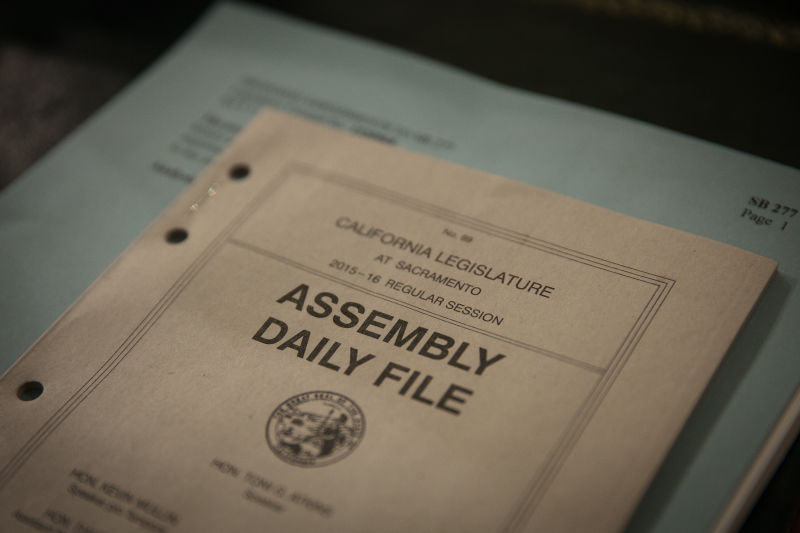Nonetheless, the climate change bills -- including the bill to enhance renewable energy, energy efficiency and the use of electric vehicles -- remain at the center of an intense social media campaign by everyone from activists to prominent actors. That marquee bill, Senate Bill 350, also made news on Tuesday, as reports suggest new life in long-rumored efforts to tone down its mandate to cut petroleum usage.
Meanwhile, other big legislative efforts also seemed to be on the rocks. A key Republican state senator expressed concerns about striking any quick deal on funding transportation, just days after public sparring between the governor's team and GOP lawmakers. And just last week, efforts on another big item -- health care financing through a new tax on managed care plans -- were dealt a setback when a major HMO advocacy group officially voiced its opposition.
Some of the notable bills that either went to the desk of Gov. Jerry Brown on Tuesday, cleared important hurdles or struggled:
Banning Confederate Names on Public Buildings: The state Senate gave final passage to SB539, a bill to outlaw existing or new government buildings and locations -- from schools to parks and beyond -- to be named in honor of a Confederate soldier. Inspired by the Charleston, South Carolina, murders in June, the bill would take effect on Jan. 1, 2017.
While some Republican legislators opposed the measure on the grounds that they said it rewrites history, bipartisan support carried it to the governor's desk.
"This measure does nothing to change our history books," said its author, state Sen. Steve Glazer, D-Orinda. "It simply says that if you were a Confederate leader, whose purpose was to break the Union into two to defend slavery, that you should not have a place of honor on public buildings in California."
Also Tuesday, the Assembly also unanimously approved a resolution encouraging the removal of Confederate flags and symbols from federal property.
Microbeads Ban: A ban on the tiny plastic beads in products like exfoliants was sent to the governor's desk after being resurrected via new amendments just last week.
Assembly Bill 888 by Assemblyman Richard Bloom, D-Santa Monica, would ban the sale of personal care products that contain "microbeads" as of 2020. Fines for breaking the law could total $2,500 a day. The late changes to the bill exclude natural exfoliants from the ban.
Bill to Ban Warrantless Searches of Cellphones, Computers: State Sen. Mark Leno, D-San Francisco, has tried for years to pass a law that subjects searches of cellphones and other electronic devices to the same standards as snail mail -- and 2015 proved no different.
The Assembly passed Senate Bill 178 with a supermajority vote on Tuesday, but not without some last-minute drama. While many Republican lawmakers supported the bill, Assemblyman Jim Cooper -- a former sheriff's captain -- warned that it would make it easier for predators to prey on children. Cooper, D-Elk Grove, argued the bill "will limit law enforcement effectiveness at investigating and prosecuting sexual predators."
Supporters, including GOP members, pushed back. Assemblyman Jay Obernolte, a Republican from Big Bear Lake who presented the bill on the Assembly floor, as well as Assembly GOP leader Kristin Olsen, R-Modesto, noted that many prominent law enforcement groups removed their opposition in recent days after Leno agreed to amend the bill to specifically address the child pornography issue.
Holding up his cellphone, Obernolte said, "It's very clear that the information in this device falls under (the) Fourth Amendment ... but unfortunately, privacy laws in California have not caught up with technology."
The Senate will take one more vote on the measure before it heads to Brown.
Government Contracts and Lobbying, Junkets: It was a big day for measures to strengthen ethics laws in the state.
Assembly Bill 1200, which would bring lobbying for state contracts under existing lobbying laws, fell one vote short in the state Senate but will be granted a second chance, known as "reconsideration," before the end of the week.
The bill would close a loophole in existing lobbying laws that exempts paid lobbying for public contracts from the same disclosure rules as lobbying for legislation or regulation. We took an in-depth look at the issue this summer, finding that it's nearly impossible to find out who's working behind the scenes to secure billions of taxpayer dollars.
The Assembly also approved Senate Bill 21, which would expand disclosure requirements around junkets for elected officials. The bill would require a nonprofit organization that "regularly organizes and hosts travel for elected officials" to disclose the names of donors who both donated to the nonprofit and accompanied an elected official for any portion of the travel. The bill would require a person who receives a gift of a travel payment from any source to report the travel destination on his or her statement of economic interests.
But there's a catch: For SB21 to take effect, the Legislature must also approve -- and the governor must sign -- Assembly Bill 10. That measure originally would have expanded disclosure around behested payments -- when an elected official asks an individual or company to give money to charities on their behalf -- but was recently amended in the Senate to instead raise the dollar threshold for when a public official has to disclose sources of income.
